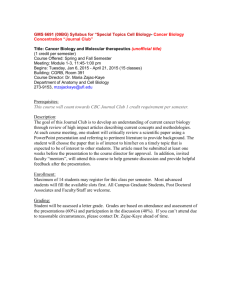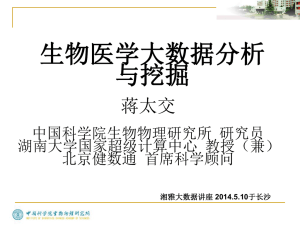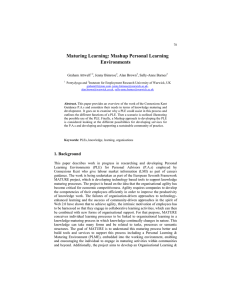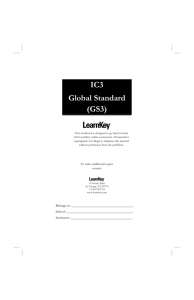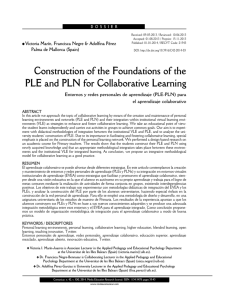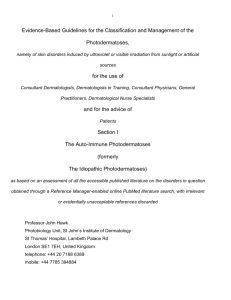BIO347 - Lycoming College
advertisement
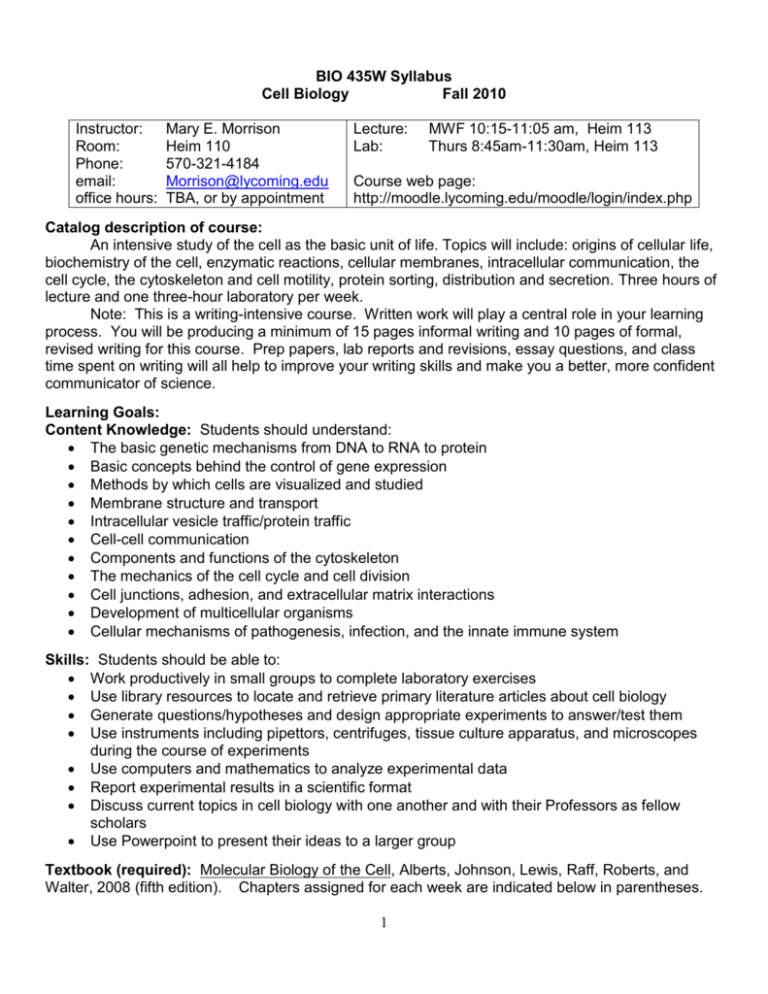
BIO 435W Syllabus Cell Biology Fall 2010 Instructor: Room: Phone: email: office hours: Mary E. Morrison Heim 110 570-321-4184 Morrison@lycoming.edu TBA, or by appointment Lecture: Lab: MWF 10:15-11:05 am, Heim 113 Thurs 8:45am-11:30am, Heim 113 Course web page: http://moodle.lycoming.edu/moodle/login/index.php Catalog description of course: An intensive study of the cell as the basic unit of life. Topics will include: origins of cellular life, biochemistry of the cell, enzymatic reactions, cellular membranes, intracellular communication, the cell cycle, the cytoskeleton and cell motility, protein sorting, distribution and secretion. Three hours of lecture and one three-hour laboratory per week. Note: This is a writing-intensive course. Written work will play a central role in your learning process. You will be producing a minimum of 15 pages informal writing and 10 pages of formal, revised writing for this course. Prep papers, lab reports and revisions, essay questions, and class time spent on writing will all help to improve your writing skills and make you a better, more confident communicator of science. Learning Goals: Content Knowledge: Students should understand: The basic genetic mechanisms from DNA to RNA to protein Basic concepts behind the control of gene expression Methods by which cells are visualized and studied Membrane structure and transport Intracellular vesicle traffic/protein traffic Cell-cell communication Components and functions of the cytoskeleton The mechanics of the cell cycle and cell division Cell junctions, adhesion, and extracellular matrix interactions Development of multicellular organisms Cellular mechanisms of pathogenesis, infection, and the innate immune system Skills: Students should be able to: Work productively in small groups to complete laboratory exercises Use library resources to locate and retrieve primary literature articles about cell biology Generate questions/hypotheses and design appropriate experiments to answer/test them Use instruments including pipettors, centrifuges, tissue culture apparatus, and microscopes during the course of experiments Use computers and mathematics to analyze experimental data Report experimental results in a scientific format Discuss current topics in cell biology with one another and with their Professors as fellow scholars Use Powerpoint to present their ideas to a larger group Textbook (required): Molecular Biology of the Cell, Alberts, Johnson, Lewis, Raff, Roberts, and Walter, 2008 (fifth edition). Chapters assigned for each week are indicated below in parentheses. 1 Course Schedule: Week Topics (relevant chapters) Week 1 Course introduction; Review of 8/30-9/3 DNA/RNA/protein; common features of cells (chapters 1, 9) Week 2 The Cell Biologist’s Tool Box: Manipulating 9/6-10 DNA, RNA, and protein (8) Week 3 Membrane structure; Membrane transport 9/13-17 and electrical properties (10, 11) Week 4 Intracellular compartments: Protein sorting 9/20-24 (12) Week 5 Intracellular vesicle traffic (13) 9/27-10/1 Friday: Midterm Exam 1 Week 6 Cytoskeleton (16) 10/4-8 Week 7 Cell junctions, adhesion proteins, and 10/11-15 extracellular matrix (19) Week 8 10/18-22 The cell cycle (17) Week 9 10/25-29 Apoptosis (18) no class on Friday 10/29—Long Weekend Week 10 11/1-5 Monday: topic TBA Wednesday: Midterm Exam 2 Cell communication (15) Cell communication (15); Development of multicellular organisms part 1 (22) Development/multicellular organisms part 2 (22); Dr. M. at SFN meeting 11/13-17; Thursday: Final revisions to Personalized Lab Experiment due to Instructor and Peer (bring 3 copies) Development/multicellular organisms part 3 (22); No class W,Th,F—Thanksgiving Break Cancer (20) Week 11 11/8-12 Week 12 11/15-19 Week 13 11/22-26 Week 14 11/29-12/3 Week 15 Pathogens, infection, and innate immunity 12/6-10 (24), OR Stem Cells (23), according to class member interests Finals Final Wednesday 12/15 1:00-4:00 pm 2 Lab Experiments 1. The cell nucleus: differential staining and introduction to light microscopy 2. Enzyme cytochemistry: peroxidase and LDH--what, where, when 3. Cell surface receptors: ConA receptor location and hemagglutination 4. Eukaryotic cell culture, part 1 5. Eukaryotic cell culture, part 2 PLE topic proposal deadline 6. Fluorescent microscopy of cells PLE reference list draft deadline 7. Protein fingerprinting: actin and myosin isoforms in different fish species—protein extraction, Bradford assays PLE materials list draft deadline 8. Protein fingerprinting: actin and myosin isoforms--SDS-PAGE and protein transfer to nylon membranes PLE materials list coordination—whole class; Draft of PLE lab packet due 9. Protein fingerprinting: actin and myosin--Western blotting receive instructor comments on PLE packet draft 10. Mitochondria: online lab exercise Personalized lab experiment: prep day PLE oral summaries due Personalized lab experiment: pilot day Last draft of PLE lab packet due Personalized lab experiment peer day OR Personalized lab experiment revision day No lab—Happy Thanksgiving! Personalized lab experiment peer day OR imaging and general catchup day Personalized lab summary and group discussion PLE Lab Report due no lab—Final Exam week! Lectures (required): Monday, Wednesday, and Friday 10:15-11:05 am Heim 113 Lecture attendance is mandatory. If you are absent more than three times during the semester, your grade will be reduced. If you are absent more than five times during the semester, I will notify your advisor and/or the appropriate Dean. Please refrain from eating or chewing gum during class because it is distracting to you, to me, and to other students. Please place all cell phones on vibrate or turn the ringer off, as ringing in class is disruptive. No texting during class. I will always be available immediately after class for questions--stop by up front after the lecture. Laboratory (one three-hour session per week, required): Thursday 8:45-11:35 am Heim 113 Lab exercises at the beginning of the course will help you to gain familiarity with common methods used in cell biology research. During this course, you will also develop your own personalized laboratory experiment (PLE), to be carried out during the last 3-4 weeks of lab, first by you and your lab partner, and then by another lab group. You will make a proposal, survey the literature to help refine your hypothesis, work with the professor to design an experiment suited to the available reagents and time, and write up your lab clearly and succinctly so that another lab group can attempt to replicate your work. The final laboratory meeting will be reserved for oral presentations of your experimental design and results, and your peers’ constructive criticism of the experiment. You will receive further detailed information on how to prepare the PLE at the appropriate times. You will have many smaller deadlines along the way to help keep you on track (see notations in bold under Lab Experiments above). NOTE: The order of group lab exercises is subject to change, pending reagent availability/shipping dates. Prep papers/Practice Questions: These are due every Monday in lecture, to help ensure that you are keeping up with the material covered in class. Each Monday, you will turn in: a. a one-paragraph summary of each lecture’s material from the previous week (3 paragraphs for a 3-lecture week, <1 page) b. a brief summary of the reading material for the week ahead (1-2 paragraphs) These assignments are due each Monday, in writing, via hard copy (not submitted via e-mail). Handwritten responses are acceptable IF your handwriting is legible to me. Class participation: To encourage students to take ownership of the learning process, each student is expected to arrive in class ready to answer questions about the material from the previous class. At the beginning of the class period, I will present several review questions. First I’ll ask for volunteers and then, if necessary, I’ll call on students at random to provide the answers. I determine which students to call on each day by rolling dice, so over time everyone will be called on with equal probability. I will model this interaction during the first and second class periods, and I will call on students during the third class period and for the remainder of the semester. To reflect my assumption that every student arrives in class willing and able to participate even if s/he is not called on that day, each student will start the semester with 50 class participation points. Students who are prepared and respond appropriately when called upon will incur no penalty or deduction from the 50-point class participation grade. Any student who is unprepared or absent when 3 called upon will lose 10 points of class participation credit. Students who volunteer to answer questions will gain 5 points in the class participation grade, but no student will earn more than 50 points total for class participation. However, I reserve the right to adjust final letter grades upward to reward regular and constructive participation in class beyond the mathematical 50-point limit. Course grading: Grades will be determined based on the following assessments: Prep papers 12 x 5 points each = 60 points Class Participation 50 points 2 Midterm exams, 100 points each 200 points Final exam--cumulative 200 points Lab reports 7 x 20 points each =140 points Personalized Lab Experiment, report, and oral presentation 200 points Total possible 850 points In addition to the required course components above, you have the option of completing Practice Question Sets that will be due periodically throughout the semester, for a maximum of 5 points each. If you score a perfect 5 on all 10 optional Practice Question sets, you will be able to add 50 points to your total. These points are added to the numerator for your final grade % calculation, but not to the denominator. If you choose not to hand in the Practice Question sets, there will be no penalty—however, these Practice Questions are the best way for you to prepare for the Exams, and failure to hand them is equivalent to throwing away bonus course points. Your grade will be determined by the number of course points you earn, minus any penalties for missed classes or labs (see above). Conversion of % of possible course points earned into letter grades is as follows: A 93.4% or above (Lycoming College does not give A+ grades) A90-93.3% B+ 86.7-89.9 B 83.4-86.6 B80-83.3 C+ 76.7-79.9 C 73.4-76.6 C70-73.3 D+ 66.7-69.9 D 63.4-66.6 D60-63.3 F 59.9 or below Makeup exams, labs, or presentations: All makeup exams or presentations will be in the form of an oral examination by the Instructor. Makeup exams or presentations will only be scheduled if the student has a bona fide medical excuse, religious conflict, family tragedy, or college-sanctioned event that prevents the student from being present on the scheduled day of the exam or presentation. Medical excuses will require the student to provide a written, dated notice from a physician explaining the student’s absence from the scheduled exam or presentation on the next class or lab day after the absence. Policy on cheating and plagiarism: From the 2010-2011 Lycoming College Academic Catalog: The College assumes that students are committed to the principle of academic honesty. Students who fail to honor this commitment are subject to dismissal. Procedural guidelines and rules for the adjudication of cases of academic dishonesty are printed in The Student Handbook. 4 How to succeed in this class: This is an advanced class in cell biology, and the time commitment required is substantial. I expect you to spend an average of 2 or more hours working on the material outside of class or lab for every 1 hour I am with you. This adds up to 10-12 hours of work per week. Skim the assigned readings before class, so you can focus on the fine points in lecture. Come to class on time and attentive, ready with questions. Take good notes of your own to fill in the details beyond the online lecture notes. Ask questions at the end of each lecture--don’t let any confusion or misunderstanding or brilliant insight go until another day. After the lecture, read the assigned readings in detail to consolidate what we’ve covered in class (but remember, exams will cover lecture points not found in the text, and lectures will show you which text points to focus on when the text goes into too much detail). Before each lab, read through the lab manual and write down any questions or points of confusion. Bring these up at the beginning of the lab session. There is no such thing as a stupid question when it comes to lab work! Keep up with the material throughout the semester to avoid cramming before exams. The weekly lecture summaries, practice questions, and reading previews are designed to help you budget your time and review your notes on a regular basis. Come see me during office hours--I like to talk with you, and I do think about other subjects beyond cell biology! If you are interested in going into more detail on a subject, jot it down and come talk with me. It could become the starting point for a Personal Lab Experiment, or a later Independent Study. 5



